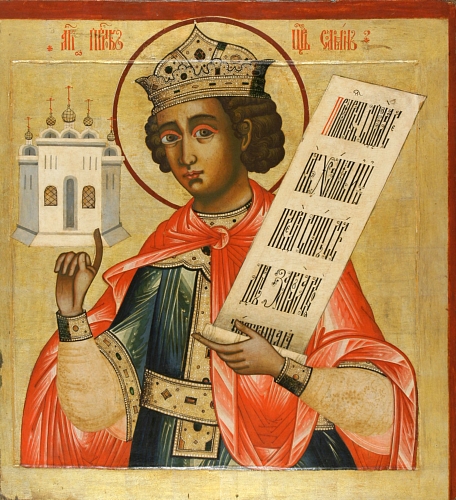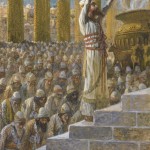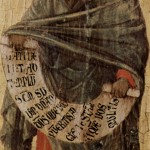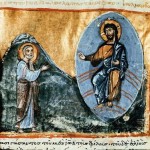
What It’s About: This passage is sort of the launch story for Solomon. It’s not the first time we meet Solomon, but it’s the place where we learn one of the defining things about him–that he was wise. Each of the early kings of the united monarchy seem to have multiple traditions about them intertwined; David, for instance, was both a shepherd and a musician. In the case of Solomon, the two big narratives are that he was an infamous philanderer, on the one hand, and a very wise person on the other. Many a joke has been made about the intersection of those two attributes.
What It’s Really About: This narrative has Solomon encounter God in a very real and visceral way. God was pleased with Solomon, it seems, and so God essentially invites him to ask his reward. That Solomon chose wisdom was itself a wise move; it’s not so different from asking the genie for infinite wishes. With wisdom, Solomon knew that he would prosper. And, of course, Solomon did prosper, to a remarkable degree, and maybe to too great a degree.
What It’s Not About: The casual nature with which the Hebrew Bible blends its insistence on temple worship in Jerusalem with the seeming profligacy of other forms of worship is breathtaking. Of course, the temple did not yet exist in the narrative that 3:3-4 describe, but it’s still surprising how easily the high places are used as settings for Solomon’s (legitimate) piety. The high places, of course, come under intense criticism from the prophets later on, as sites of degenerate idolatry. But here, they are still licit places to worship God–who might still have the mists of the storm god about. This is God before God’s domestication (in the literal sense of the word) in the temple (bet, house, in Hebrew) in Jerusalem.
Maybe You Should Think About: It’s early in election season to be making references to politics, at least in my book, but we’ve also begun our every-four-years conversation about power and ethics pretty early this cycle. So maybe, as we fire up the 24 hour engines of the campaign season, it would be useful to read this story from early on in Solomon’s reign, and ask what it can tell us about the pursuit of power and the qualifications we ought to expect for those who wield it.
What It’s About: I’ve said before, as the lectionary has worked its way through Ephesians, that most scholars think that Paul probably didn’t write Ephesians. This passage seems to me to be evidence for that. Paul certainly thought that time was short; he expected the parousia any day. But I don’t know that the language about the days being “evil” sounds very Pauline to me. What follows–a standard vice list turned into moral exhortation–is maybe a little bit more characteristic of Paul, but on the whole Paul tended to think of time as neutral, and the world as corrupt and ending soon. I don’t know that time itself would be evil, in Paul’s eyes.
What It’s Really About: This passage is pretty typical of eschatological expectation. The formula is this: time is short, this world is bad, so eschew the patterns of this world and live as if you were already in the next one. But how does this preach in an era when the eschaton has not come? This message makes some sense in the late first century, but how does it sound in the early 21st century? Some Christian communities, of course, do expect the immanent end of the world, and preach this passage accordingly. But for many, the world’s end is not so immediate, so what then do we do with these end-times ethics?
What It’s Not About: When I traveled in evangelical circles, this was one of the classic proof-texts about abstinence from alcohol. It was used, of course, in the face of many other texts that assume alcohol assumption or even advocate for it. But viewed in the context of vice lists and moral exhortation at the end of days, this seems very unconvincing as a proof-text for teetotaling.
Maybe You Should Think About: How do we preach end-of-days texts when we live so far past the end the texts foresaw? How can we be authentic to the text while also acknowledging that those people had their timing very wrong?
What It’s About: This is one of Jesus’ “I am” sayings in John–one of the stories in which Jesus uses the Greek equivalent of what God said to Moses at the burning bush in Exodus. This is John’s way of hammering home, in case you didn’t catch the hint, that Jesus is God. This particular saying is kind of a proto-eucharistic text, foreshadowing later Christian liturgy in which Christians would be invited to consume the body and blood of Jesus–either symbolically, literally, or somewhere in between. I cannot imagine that it made much sense in-context (and “the Jews,” a common foil in John’s gospel, don’t seem to get what Jesus is driving at–and why should they?). By the way, on the subject of “the Jews,” see the last section of this post.
What It’s Really About: This is really about later Christian theology. Unless you think that Jesus went through life with a fully-formed idea of Christian liturgy in his head, and that he was always laying the groundwork for that liturgy in the things he said, it’s hard to take this as a historical saying of Jesus. (The sentence above is, incidentally, exactly what the author of John wants you to think Jesus went through life thinking and doing). But I don’t think it should bother us too much that this was a later saying put onto Jesus’ lips or embellished to reflect later practices. Of course the people who wrote down the gospels did so through the lens of their own experiences. Why wouldn’t they?
What It’s Not About: Christians came in for a lot of criticism on this front. One of the earliest charges leveled against Christians–alongside incest–was cannibalism. It’s not hard to imagine why. They believed that their dead leader had instructed them to eat his body and drink his blood. That’s some seriously bad PR, and Christians were accused of all manner of unseemly things. Later on these things faded, of course, and became accepted (more or less) for their symbolic meanings, but if you met an early Christian and took her seriously about her worship practices, you might have been alarmed!
Maybe You Should Think About: “The Jews” of 6:52 (and elsewhere in John) are a troublesome issue for at least two reasons. First, the phrase lumps all Jews in together, in a way that erases differences between different factions, and allows modern readers to lump ancient Jews in with modern ones as “Christ-killers.” Second, the translation of the Greek (Iudaioi) into the English the Jews is troublesome and by no means obvious, as Adele Reinhartz and others have argued in recent years. The term is broad, and might not have been meant to refer to a religious or ethnic group at all, but rather a geographical one. (Think of how “Americans” means something different in different contexts, and you’ll have some sense of the trouble). So as you preach this and other texts, especially from John and Matthew, be aware of how much work the translation is doing for you. If you have the ability, look at the Greek yourself, and no matter what make sure that you aren’t conflating (or allowing others to conflate) ancient people with modern ones. Much violence has been sparked by this kind of laziness in exegesis, and there’s no excuse for it anymore.
















